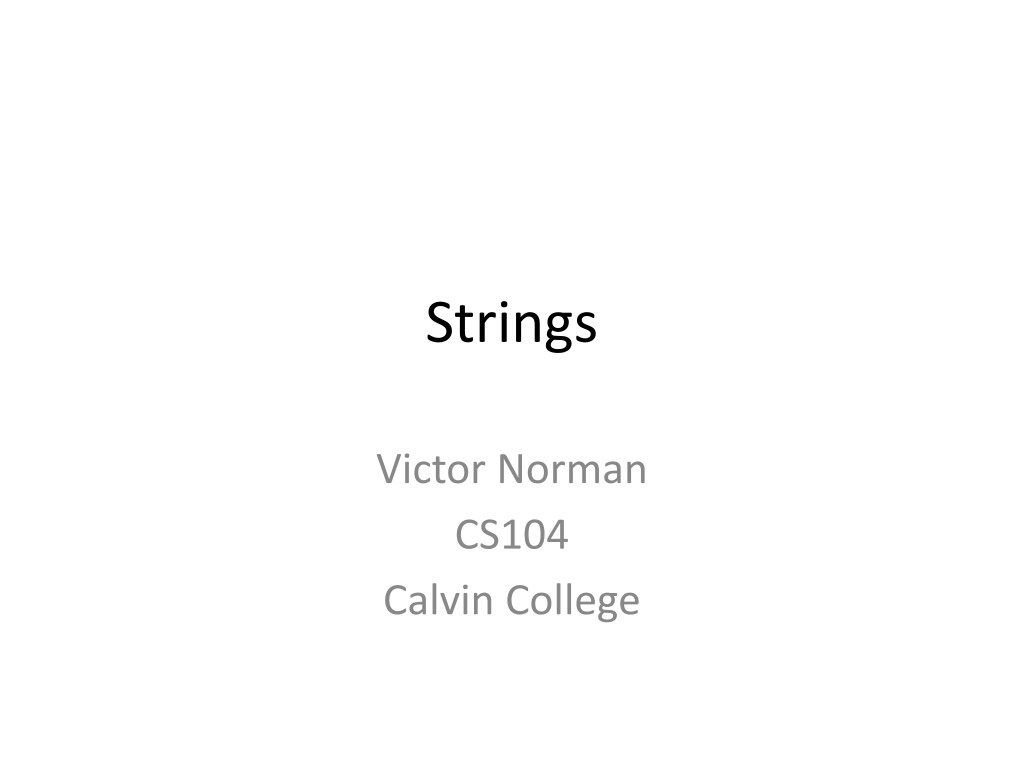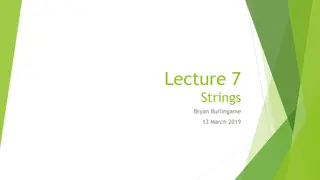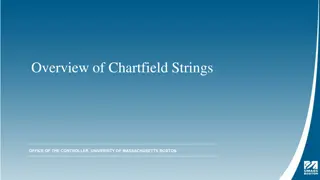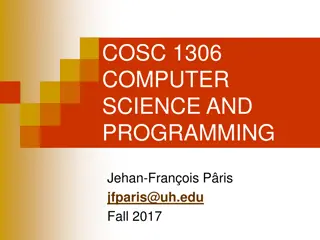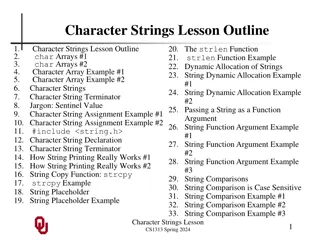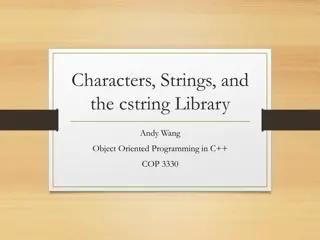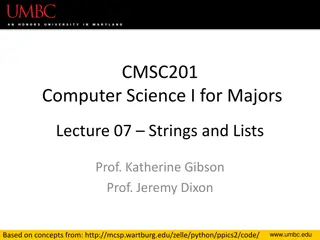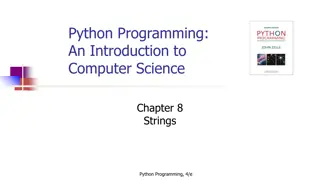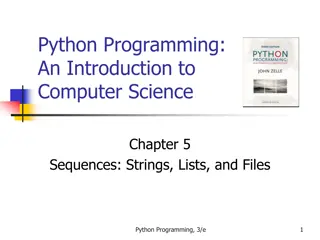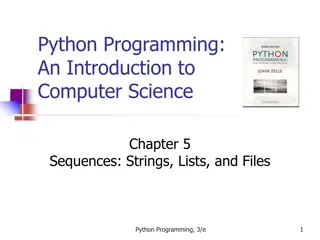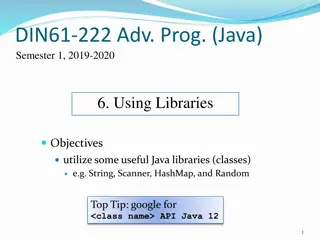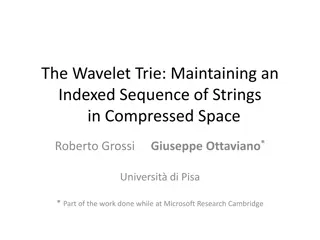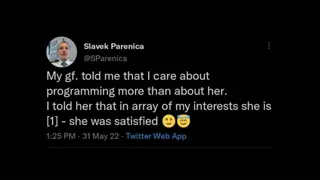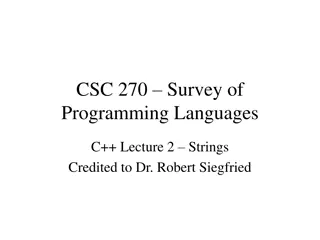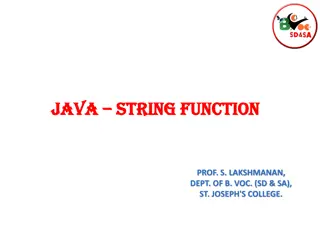Understanding Strings and Operations in Programming
This content delves into the concepts of strings, their manipulation methods, and various operations related to strings in programming. It covers collection data types, immutable nature of strings, string operations like concatenation and slicing, comparing strings, and practical examples of string manipulation through code snippets.
Download Presentation

Please find below an Image/Link to download the presentation.
The content on the website is provided AS IS for your information and personal use only. It may not be sold, licensed, or shared on other websites without obtaining consent from the author. Download presentation by click this link. If you encounter any issues during the download, it is possible that the publisher has removed the file from their server.
E N D
Presentation Transcript
Strings Victor Norman CS104 Calvin College
Reading Quiz Counts toward your grade.
Collection Data Type a data type that consists of multiple smaller data items. aka composite data type . items may have to be one type or may be of multiple types. Data may be ordered or not. string: each item is a single character. Ordered. list: items may be any type. Ordered. dictionary: items may be any type. Unordered. objects: any type. Unordered.
String Type consists of multiple characters, in order. may be empty: is immutable: Cannot be changed once it is created. Any string methods that seem like they may be changing the string must be returning a new string. newName = name.capitalize() # returns new str, name unchanged
String Operations +: concatenates two strings to make a new string. E.g., newStr = oldStr1 + oldStr2 []: indexing/subscripting: stringname[index]. index from 0 to n 1. result is a new string (of length 1). upper(), lower(), strip() produce new strings.
Come on and Click! What is the value of s after the following? s = abc s = d * 3 + s s = s + * 3 s = s + q
CQ 2 What is the value of s after this code is executed? s = What is your name? s.upper()
Slicing Operation Syntax and operation similar to indexing, but results in shorter new string derived from the original. indexing: result string length is 1. slicing: result string length may be > 1. somestring[n:m:s] start at character n in somestring. go up to but not including character m. by step s. no n beginning; no m end; no s 1.
Comparing Strings use == or !=. can compare with <, >, etc.., but really not used very often.
Put on your red shoes and click the blues CQ 1: What is the output of this code? sketch = argument clinic print(sketch[7:-1])
CQ 2 What does t hold? s = Knights of Ni! t = s[:]
CQ 3 What does t hold? s = Knights of Ni! t = s[::-1]
Item-based vs Index-based Iteration item-based: for <item> in <sequence>: <item> is each item in the sequence. index-based: for <idx> in range(len(<sequence>)): code in the body has the index of what item to deal with, as someSeq[idx]).
Examples of each Item-based for cheese in cheeses: print(cheese) Index-based for idx in range(len(cheeses)): print(cheeses[idx])
When to use which? Item-based: simpler syntax, easier to read. use when code does not need to know where the item is in the sequence. Index-based: harder to read. accessing the item is more complicated (using indexing operator). code can know where the item is in the sequence. code can access other items around the item.
Example What if we want to print out the cheeses like this: 1. Cheddar 2. Gouda 3. Venezuelan Beaver Cheese Need to use index-based:
Example continued for idx in range(len(cheeses)): # idx starts at 0, but we want to # print out as if indices start at 1, # so add 1. print(str(idx + 1) + . , cheeses[idx])
Accumulator Pattern resStr = # initialize var to empty or 0 for ch in someStr: # for each item if isConsonant(ch): resStr = resStr + ch # add to result Used item-based, because didn t care about where we were in the string. someStr is a sequence, so syntax is legal. results accumulated in resStr
Whiteboard/IDLE Activity Write the following function that returns a string that is the same as s except that spaces are removed. def remove_spaces(s):
Whiteboard/IDLE Activity Write the following function that returns a string that is the same as s except that spaces are removed. def remove_spaces(s): resStr = for ch in s: if ch != : resStr = resStr + ch return resStr
while Loop vs Index-Based for Loop for i in range(len(s)): code here uses s[i] i = 0 while i < len(s): use s[i] i = i + 1 # better: i += 1
in and not in very useful for searching a string to see if string is in the string or not. returns Boolean: so you know if the target is in the string, but don t know where. if wherefore in hamletText: print( art thou )
Optional Parameters Terminology: parameters may be optional in the call. in function definition, optional params must appear on the end of the parameter list. indicated by being given a default value. Code in the function is exactly the same.
Examples def weird(a, b, c=3): return a + b + c print(weird(3, 7)) print(weird(3, 7, 44)) def weirder(a=3, b=4, c=5): return a + b + c print(weirder()) print(weirder(7)) print(weirder(7, 8)) print(weirder(7, 8, 9))
Examples def something(a, b, debug=False): res = a + b if debug: print( something returning + res) return res x = something(44, -10) x = something(44, -10, True) # turn on debugging
Activity Write a function that removes certain letters from a given string. If no letters are given, it removes all vowels (not including y). You can assume everything is lowercase. The result is returned. def remove_chars(s, <stuff>): # remove from s
Activity Write a function that removes certain letters from a given string. If no letters are given, it removes all vowels (not including y). You can assume everything is lowercase. The result is returned. def remove_chars(s, ch2rem= aeiou ): res = for ch in s: if ch not in ch2rem: res = res + ch return res
Activity continued Given a string s, write code to call your function on s to remove all vowels. Then, write a function call to remove all letters from a to f, inclusive. Print the results. print(remove_chars( Monty Python )) # should print Mnty Pythn print(remove_chars( Monty Python , My )) # should print ont Pthon
Assignment LOTS of CodeLab questions about strings. Very good practice.
